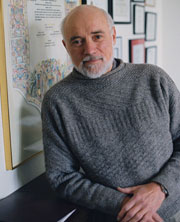
Philip Portoghese, PhD
Titles
Education
PhD, Medicinal Chemistry, University of Wisconsin, 1961
M.S., Columbia University
Bachelor's, Columbia University, 1953
Biography
Bio
2000 – 2023 University of Minnesota: Distinguished Professor of Medicinal Chemistry
1987 – 2023 University of Minnesota: Professor of Pharmacology
1974 – 1983 University of Minnesota: Head of Medicinal Chemistry Department
1974 – 1986 University of Minnesota: Director of Graduate Studies in Medicinal Chemistry
1972 – 2011 Editor-in-Chief, Journal of Medicinal Chemistry, American Chemical Society
1969 – 2000 University of Minnesota: Professor of Medicinal Chemistry
1964 – 1969 University of Minnesota: Associate Professor of Medicinal Chemistry
1961 – 1964 University of Minnesota: Assistant Professor of Medicinal Chemistry
Expertise
Professor Portoghese's research focus has been in the area of opioids and opioid receptors. Concurrent with his research activities, he has served as Editor-in-Chief of the Journal of Medicinal Chemistry (1972-2011) for the American Chemical Society. With graduate faculty appointments in Pharmacology and Neuroscience in addition to his home Department, he has ongoing research collaborations in these departments and elsewhere at the University of Minnesota Academic Health Center. Some of the major contributions of Prof Portoghese's research group have been based on the development of concepts that relate to the interaction of opioid ligands with opioid receptors. The multiple modality concept based on the structure-activity relationships of opioid ligands led to the proposal of multiple opioid receptors (1965), which at that time was a departure from the prevailing view of a single receptor type. His group developed selective opioid antagonists such a BFNA (u), nor-BNI (k), and naltrindole (o) that presently are standards for the three opioid receptor types employed in opioid research. His initial studies with bivalent ligands that contain two mu opioid pharmacophores, led to the first propose mu opioid receptor dimers (1982). With the first report (1999) opioid receptor heterodimers (heteromer) by others, Prof Poroghese's research veered to the design of ligands that recognize opioid receptor heteromers, that is the theme of his current research. In this regard, his group has focused on bivalent ligands as agents to study or treat pain associated with neuropathy. This approach has led to the recent development of bivalent ligands (MMG22, MCC22) that produce profound antinociception (fmol ED50 range) without tolerance in the treatment of neuropathic pain.
Awards & Recognition
- 2020 Research Achievement in the Pharmaceutical Sciences, Academy of Pharmaceutical Sciences, American Pharmaceutical Association
- 2015 Takeru Higuchi Research Prize, Academy of Pharmaceutical Sciences, American Pharmaceutical Association
- 2010 American Chemical Society established "The Philip S. Portoghese Lectureship,” presented annually by an outstanding researcher at a national ACS meeting.
- 2007 Member, Medicinal Chemistry Hall of Fame, Div. of Medicinal Chemistry, American Chemical Society
- 2006 Nauta Award in Pharmacochemistry, European Federation of Medicinal Chemistry
- 2003 Academy for Excellence in Health Research, Academic Health Center, University of Minnesota
- 2001 Institute of Scientific Information, "one of the most cited, influential researchers" in his field
- 2001 Weaver Medal, College of Pharmacy, University of Minnesota
- 2000 Citation of Excellence in Teaching, Research, and Service, University of Minnesota
- 2000 Distinguished Professor, University of Minnesota
- 2000 Alfred Burger Award in Medicinal Chemistry, American Chemical Society
- 1999 The Oak & the Tulip Medal, presented by the sponsors of the Camerino-Nordwijkerhout Symposium, The Italian Chemical Society, and the European Federation of Medicinal Chemistry
- 1999 Pharmacy Honor Society Award, Rho Chi
- 1997 – 2006 MERIT Award (Method to Extend Research In Time) National Institutes of Health
- 1996 Citation of Merit, University of Wisconsin
- 1992 Honorary Doctorate, Royal Danish School of Pharmacy, Copenhagen
- 1991 Edward E. Smissman-Bristol-Myers-Squibb Award, Medicinal Chemistry Division, ACS
- 1991 Nathan B. Eddy Award for Excellence in Drug Abuse Research, College on Problems of Drug Dependence
- 1990 Research Achievement Award in Medicinal Chemistry, American Association of Pharmaceutical Scientists
- 1990 Medicinal Chemistry Award, Division of Medicinal Chemistry, ACS.
- 1986 Honorary Doctorate, University of Catania, Italy
- 1984 Ernest H. Volweiler Award for Outstanding Contributions to Research in the Pharmaceutical Sciences, American Association of Colleges of Pharmacy
- 1980 Research Achievement Award in Medicinal Chemistry, APhA Academy of Pharm. Sci.
- 1973 – 1974 Gustavus A. Pfeiffer Fellow, American Pharmaceutical Association
Professional Associations
American Chemical Society
Research Summary
Prof. Portoghese’s laboratory is focused on the design and synthesis of compounds that target opioid receptors, both as pharmacologic tools and as agents for treatment of pain. Novel concepts and approaches are employed for development of analgesics that are highly selective for different types of opioid receptors. These studies have utilized animal studies, cloned receptors and molecular modeling as an aid to obtain insight into the recognition of ligands by opioid receptors.